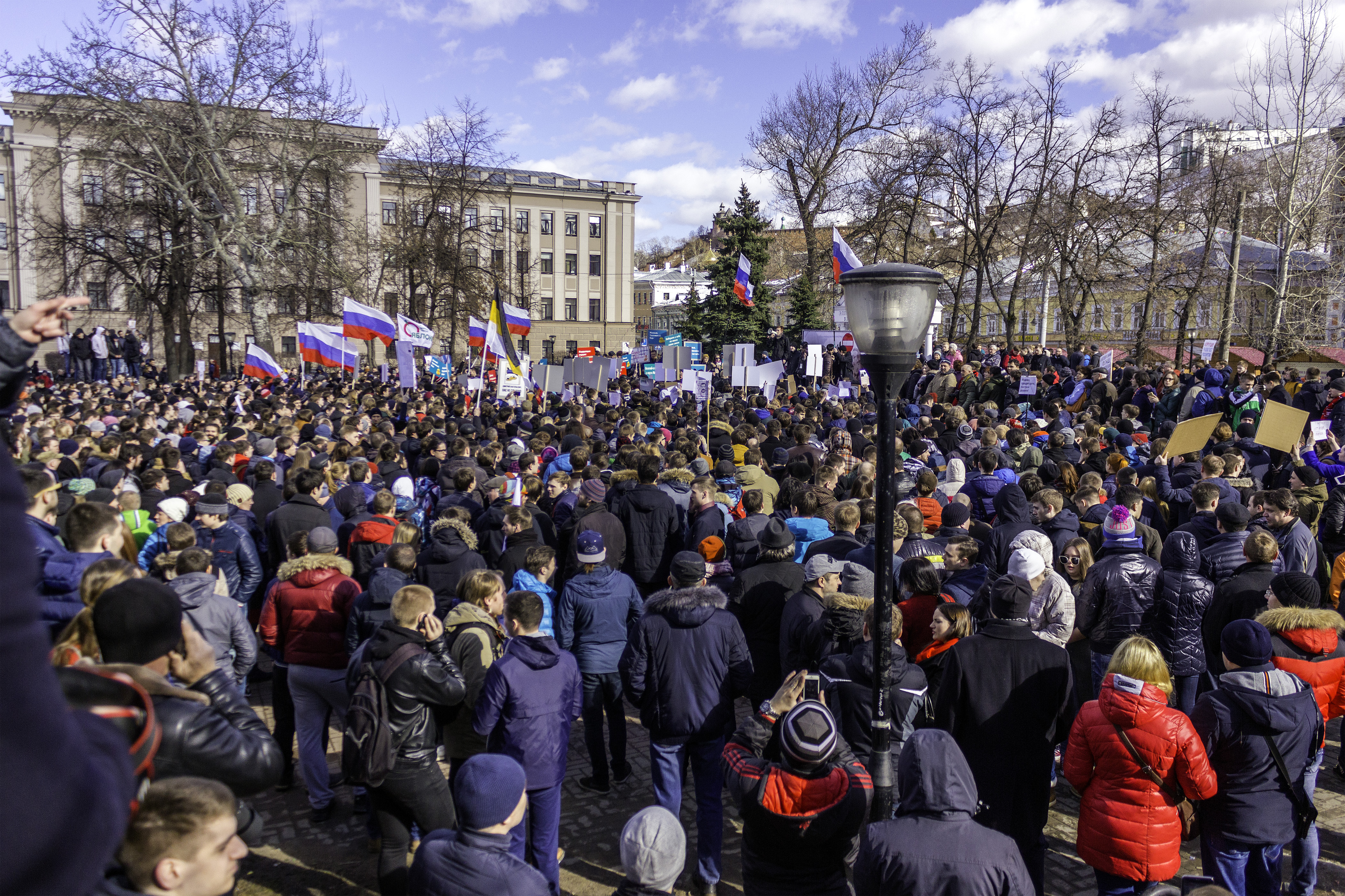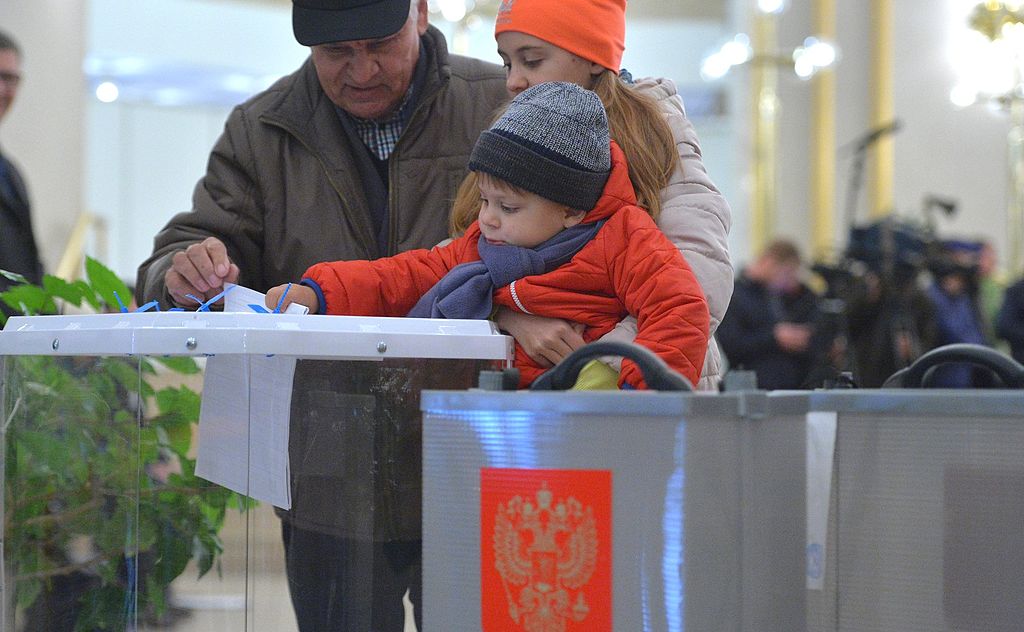What Happened to Competition in Russia?
 Demonstrators march in Nizhny Novgorod at an anti-corruption rally
Demonstrators march in Nizhny Novgorod at an anti-corruption rally http://bit.ly/2mFfWvF
“Competitive authoritarian regimes [are] competitive, in that democratic institutions are not merely a façade: opposition parties use them to seriously contest for power; but they are authoritarian in that opposition forces are handicapped by a highly uneven – and sometimes dangerous – playing field. Competition is thus real, but unfair.” Levitsky and Way’s analysis of post-Cold War hybrid authoritarian regimes rings just as true today as it did seven years ago. Politics in Russia are dominated by a majority party and, though opposition movements exist, they are weak and generally do not pose serious threats to incumbent officials. This lack of competition presents an acute concern for the long-term quality of Russian democracy, and recent events showcasing the extent to which opposition movements face difficulty present a concrete example of just how deficient Russian democracy may be.

http://bit.ly/2nqUY2v
This past weekend, massive anti-corruption protests were launched across Russia. Undeterred by words of caution from officials who had not sanctioned the demonstrations, thousands of people turned out to march and hundreds were detained across the country. The marches were lead by opposition leader Alexei Navalny as a direct attempt to confront the Russian government with allegations levied against Russian prime minister Dimitry Medvedev. In a film released on March 2nd, 2017 Navalny’s non-profit organization Фонд борьбы с коррупцией (ФБК) accused the former president of corruption and embezzlement, suggesting that Medvedev used funds from foundations officially owned by his close friends for his personal gain. Following the dump of Medvedev’s personal information though hacking activity, online purchases made in the name of a Vladimir Dyachenko were linked to Medvedev by matching the items purchased with public photos of Medvedev. Shortly after an order was placed for a colourful pair of Nike sneakers or a shirt, Medvedev would be seen sporting the very same articles of clothing. After investigating links more closely, ФБК felt confident in accusing Medvedev of having orchestrated a webbed network exploiting charity foundations to obtain bribes from oligarchs and amass wealth.
For two weeks following the release of the film, the government declined to comment officially on the allegations. In response, Navalny called for protests to be held across Russia to bring attention to the scandal. Officially, roughly 500 people were said to have been detained by police forces in Moscow, though some monitoring groups have suggested that the number could be as high as 850. Navalny was one of the first to have been detained, yet despite the high-profile nature of the event, there was all but total radio silence from media organizations. When and if mentioned, the events were downplayed and spun to prevent this event from gaining traction. Medvedev’s spokeswoman Natalya Timakova has dismissed the accusations of ФБК saying, “It is pointless to comment on the propagandistic outbursts of a convicted opposition figure.” Herein lies the controversy surrounding Navalny and the nature of Russian politics. Navalny has been a long-time vocal opponent of Putin and, after being tried and convicted of embezzlement, he has been barred as a convicted criminal from running for president in 2018. His case is one of many examples of challenges facing opposition figures that dare to compete in Russian politics. These challenges may range from the comparatively benign bias with which state media covers Russian politics, to the more deadly and sombre murder of opposition leader Boris Nemtsov, though they always are shrouded by a veil of plausible deniability.

http://bit.ly/2nqJVXa
Indeed, as a consequence of difficulties facing challenges to incumbent rule, Russian politics as a whole have suffered. On September 18th, the results of Russia general election to the state Duma were announced. To the surprise of few, Единая россия (United Russia) carried a victory winning 343 out of 450 seats (a 105 seat increase since the 2011 elections) netting it a supermajority in the Duma. Their victory is largely unremarkable. They have consistently been the party in power since 2003 and, as the party affiliated with Vladimir Putin, enjoy the support of much of Russia. What was notable, however, was the lack of activity surrounding the elections as well as the remarkably low turnout. According to the Levada Center, 89% of Russians were not following the election very closely or at all. Nationwide, only 47% of Russians voted in the election with as little as 35% of Moscow residents participating. Monitoring agencies shortly announced that, though election irregularities were less frequently observed in this election than in 2011, “the number of violations during the campaign should be recognized as large.”
Barriers to full political competition in Russia notwithstanding, low voter participation in Russian elections (or in any elections really) is not necessarily indicative of a Kremlin scheme orchestrated by Putin to harshly repress an unwilling electorate to vote for him and Единая россия. Low turnout may be as legitimate as high turnout provided the right to vote exists and that people have fair access to vote. Certainly, one may point to concerning events, such as the classification of the Levada Center as a “foreign agent” following its publication of polls suggesting a slight decline in support for Единая россия, but even polls published by the selfsame independent agency indicate a legitimate and not insignificant degree of support for Putin and the general direction in which the country is heading. It is entirely possible that the protesters demonstrating their frustration with the administration and support for Navalny are but a vocal minority in a country perfectly content with the status quo, insofar as political leadership is concerned. The local authorities are then certainly justified in applying sanctions to unruly demonstrators that refuse to comply with formal laws mandating that manifestations be approved; certainly, there ostensibly should not be indignant outrage over the fact that those who refuse to obey the law face penalties for their actions. If there do not seem to be major divisions in Russian politics and support for the leadership is largely genuine, why artificially install divisions?
However, the broader and more significant point is this: certainly by some overly charitable accounts, low voter participation and struggling opposition may continue to seem democratic, but it would be disingenuous and counterintuitive to describe this as democracy, or at least as a healthy democracy. A system dependent on the participation of a handful of willing citizens – one consistently dominated by one political narrative – does not appear to be one that regularly secures the will of the people or even represents it. A democracy is not maintained by the formal selection of leadership at the hands of a token share of the electorate. Rather, it is developed through the regular, collective, and active civic engagement of enfranchised people.
Medvedev’s colourful Nikes and lavish vineyards have incurred the dissenting clamours for reform from Russians this time, and decisive dismissal by authorities of this movement as the opportunistic exploitation of a criminal moonlighting as a political candidate can only go so far. For long-term improvements to emerge in Russia, challenges to incumbent rule must be allowed the fair opportunity to compete. In the words of Levitsky and Way, “when incumbent manipulation of state institutions and resources is so excessive and one-sided that it seriously limits political competition, it is incompatible with democracy.” Hope for future vibrancy of Russian democracy is contingent on the opening-up of this space within which opposition movements can compete fairly. To the extent that that opportunity is not present, it remains difficult to describe Russian democracy as healthy.
